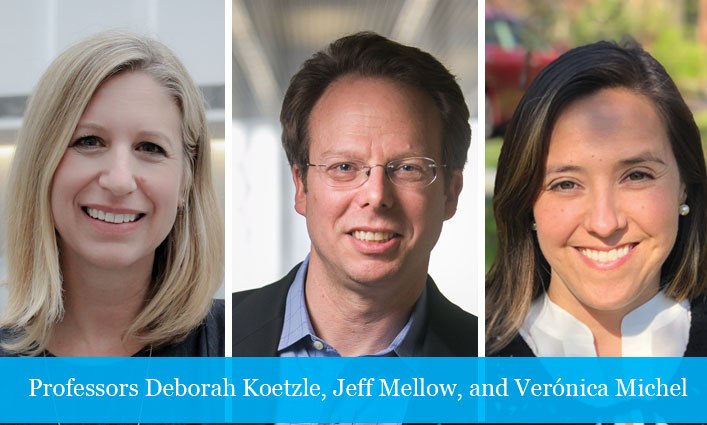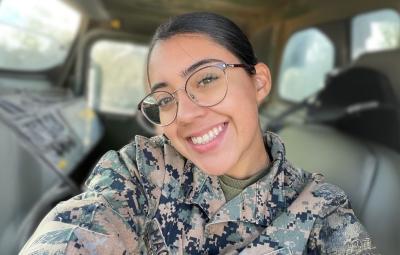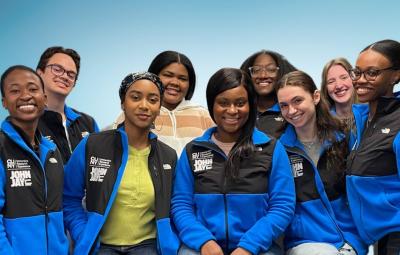
The U.S. Department of State’s Bureau of International Narcotics and Law Enforcement Affairs (INL) has awarded Criminal Justice Professors Deborah Koetzle, Ph.D. and Jeff Mellow Ph.D., along with Political Science Associate Professor Verónica Michel, Ph.D., $2.5 million to survey prisoners in Guatemala, El Salvador, Honduras, and Panama. They’re focusing on the prisoners’ perceptions and experiences regarding due process, the rule of law, and life in prison. The professors have also partnered with the University Institute of Public Opinion in San Salvador, a leading public opinion institute in the region to conduct the surveys, and Rowan University in New Jersey. “The aim of these projects is to learn more about the functioning of the accusatorial criminal system in these countries, and to further strengthen the correctional system by developing critical rule of law indicators,” says Koetzle. “Findings and recommendations regarding how each country is processing, managing, and treating its correctional population will be shared with regional stakeholders.” We connected with the professors to learn more about this ambitious criminal justice research.
“With this project, we want to learn how an individual’s experience in the criminal justice system and life in prison impact their perception of justice.” —Deborah Koetzle
Your work will be focusing on incarcerated individuals in Guatemala, El Salvador, Honduras, and Panama, why is it important to focus on these countries?
Koetzle: Strengthening the rule of law is a key foreign policy objective and these projects, funded by INL’s “Western Hemisphere Rule of Law Index and Analysis Program” aim to support that goal. One of INL’s objectives is to help partner nations improve their criminal justice systems by enhancing judicial effectiveness and advance respect for human rights. INL funded six projects aimed at assessing the rule of law throughout much of Latin America and the Caribbean. While the other grants, awarded to the World Justice Project, focus on general public and citizen perceptions, our projects focus specifically on the experiences of those living in prison in Guatemala, El Salvador, Honduras, and Panama.
“In Guatemala, about two percent of homicide cases reach a court and its prisons are occupied at 372 percent capacity.” —Deborah Koetzle
Knowing about the experiences of those in prison is important generally, and especially for countries that may not have as many resources available. In the last decades, the Central American countries in our study have implemented ambitious criminal justice reforms, including transitioning from an inquisitorial to an accusatorial model of criminal justice—Guatemala in 1994, Honduras in 2002, and El Salvador and Panama in 2011—however, few crimes are punished and many of the prisons in Central America are overcrowded. In Guatemala, about two percent of homicide cases reach a court and its prisons are occupied at 372 percent capacity. With this project, we want to learn how an individual’s experience in the criminal justice system and life in prison impacts their perception of justice. Having equal access to justice matters and this includes people in prison. These projects will help to identify challenges and where improvements are needed.
What research work have you previously done that’s helped inform and shape this new grant project?
Michel: My research has focused on the rule of law, access to justice, and criminal procedure reform. Before I arrived at John Jay, I conducted fieldwork in Guatemala, Mexico, and Chile to better understand how the right to private prosecution helps victims of crime and human rights violations access justice. The findings of this research are described in my book Prosecutorial: Accountability and Victims’ Rights in Latin America. Since then, I’ve continued to do comparative work studying victims’ rights, public prosecutors’ offices, and the issue of impunity.
Mellow: Debi and I have been working to apply evidence-based, empirically-verified practices to corrections for many years. We started collaborating a few years ago because of a shared interest in international settings and the complementary nature of our research. Debi’s work focuses on effective correctional interventions, including risk/need assessment, correctional programming, and evaluation. My work focuses on issues in corrections, including reentry, critical incidents, and program evaluations. Both of us have an interest in improving the correctional system and outcomes, and we’re curious about whether lessons learned in the U.S. could be useful elsewhere. The grant we received in 2017—funded by the U.S. Department of State’s Bureau of International Narcotics and Law Enforcement—allowed us to work with the El Salvador prison system to support efforts to reduce overcrowding. The project included hiring and training criminological technical teams to assess individuals and draft early release proposals. As part of that previous project we visited the prisons, met with prison directors, and interviewed staff about the process. The knowledge gained from this project was helpful in designing the current project, especially considering the logistics of conducting interviews in prisons.
There are two grants being awarded. How and why are they split up?
Koetzle: Our two projects are part of a larger initiative by INL. We were specifically interested in the projects related to prison settings and the transition to the accusatorial system because of our own research interests. Jeff and my project is related to the experiences and perceptions of those in prison in El Salvador and Guatemala. While Veronica’s project extends this to Panama and Honduras, with a focus on the transition to an accusatorial model of criminal procedure. Even though they were funded separately, we see these as one large project and wrote both proposals with the idea of working together. In practice, it feels like one project and we can’t imagine running them separately.
Understanding that we’re still living through a pandemic—and the areas you’re focusing on could be “hot spots”—how has the pandemic affected your research plans?
Mellow: Our primary concern is the safety of our team and the people in prison. Both our partners in El Salvador and CUNY have very structured and defined protocols in place to help us navigate the challenges of doing research in prison and abroad. We’re purchasing PPE and making sure that people have access to Covid-19 testing. All of our protocols will be reviewed by CUNY. We won’t start data collection until our protocols are fully reviewed and approved, hopefully, late in the summer.
How does being a Hispanic-Serving Institution—with so many of our students either being from or having family in those regions—play into your research and work? Is there any thought to having students contribute to the research work?
Michel: I’m from Mexico, so one of the things that I enjoy the most about my work at John Jay is this link to the Hispanic community. The three of us have always agreed on the importance of our students having an international perspective of criminal justice issues. Because we are a Hispanic-Serving Institution, we have really focused much of our research in Latin America and the Caribbean, and we make an effort to include the region in our teaching whenever we can. As you’ve said, many of our students or their families are from this area. This makes this region important to students and faculty, both geographically, culturally, and personally.
“The three of us have always agreed on the importance of our students having an international perspective of criminal justice issues.” —Verónica Michel
Koetzle: One of the great things about projects like this is that we also get to hire students. We have three doctoral students on our research team, all of whom have ties to Latin America. We hired two Criminal Justice Ph.D. students—Irina Fanarraga is from Peru, and Sebastián Galleguillos is from Chile. We also hired a Political Science Ph.D. student, Ian Kaufman, who lived in Argentina for a number of years when he was a child. And Joel Capellan, Ph.D., who is working with us at Rowan, is a graduate of the John Jay/CUNY Graduate Center Criminal Justice Ph.D. Program. Having student participation and an international research team helps ensure that we remain sensitive to regional and cultural differences.
If all goes according to plan with your research, what do you hope to walk away with and how do you want to apply that information to other countries and our country?
Mellow: Our goal is to develop an understanding of the experiences of people in prison—both their experience with the criminal justice system and with life in prison. We want to use our findings as the basis of meaningful recommendations for stakeholders that will help to improve the lives of people impacted by the criminal justice system in those countries. We hope stakeholders will use our results to make data-driven decisions. We know change takes time. The project itself is expected to be two years, but we see this as the first step and hope to extend this line of work to other countries.
“We want to use our findings as the basis of meaningful recommendations for stakeholders that will help to improve the lives of people impacted by the criminal justice system in those countries.” —Jeff Mellow
Koetzle: We have been aware of the tremendous efforts countries in the region have taken to improve their criminal justice system—including the transition from the inquisitorial system to the accusatorial system of justice with the goal of improving efficiency and access to justice. We recognize that many countries in Central America have had to manage their prison systems with limited resources and very high crime rates, which is very challenging for these systems. We also know that there have been few surveys in prisons, so we are very much looking forward to seeing what our findings teach us on these topics.
“This type of research is an important element of developing a global understanding of the criminal justice system.” —Deborah Koetzle
What’s the main thing you want our community to know about your upcoming research and the incredible grant that’s supporting it? Why is this work critical?
Koetzle: This type of research is an important element of developing a global understanding of the criminal justice system. Assessing levels of justice and due process are consistent with the College’s mission and values, and we are honored to be able to represent John Jay in this way.



